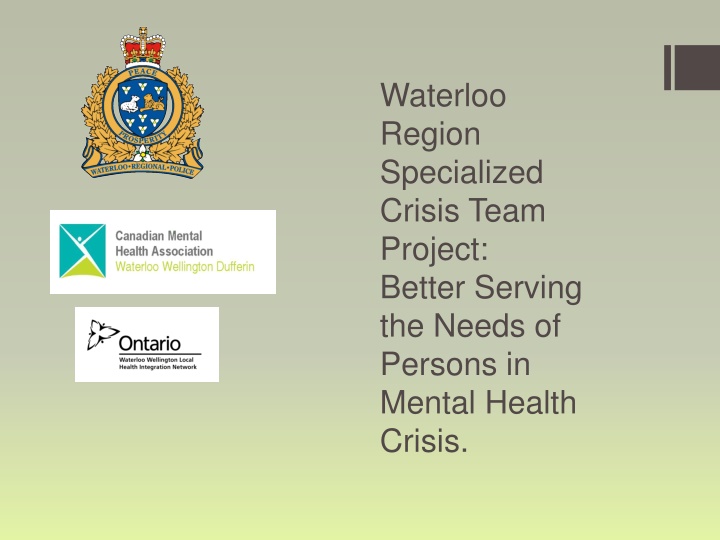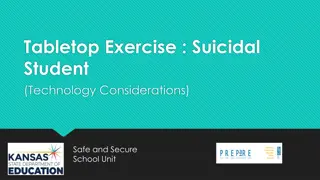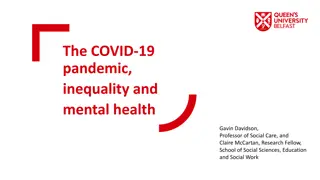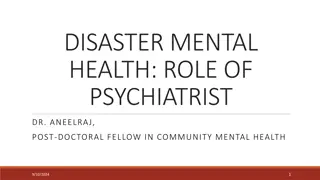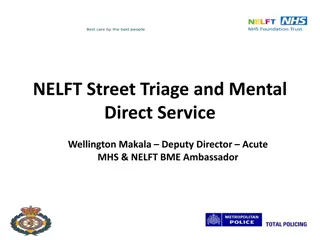Enhancing Mental Health Crisis Response in Waterloo Region
The Waterloo Region Specialized Crisis Team Project aims to improve the response to individuals in mental health crisis by strengthening collaboration between police, community mental health, and acute mental health services. Through strategic partnerships and funding, the project has implemented measures to enhance care, reduce apprehensions, and improve hospital admission rates, while providing training for officers to interact effectively with individuals in crisis.
Download Presentation

Please find below an Image/Link to download the presentation.
The content on the website is provided AS IS for your information and personal use only. It may not be sold, licensed, or shared on other websites without obtaining consent from the author.If you encounter any issues during the download, it is possible that the publisher has removed the file from their server.
You are allowed to download the files provided on this website for personal or commercial use, subject to the condition that they are used lawfully. All files are the property of their respective owners.
The content on the website is provided AS IS for your information and personal use only. It may not be sold, licensed, or shared on other websites without obtaining consent from the author.
E N D
Presentation Transcript
Waterloo Region Specialized Crisis Team Project: Better Serving the Needs of Persons in Mental Health Crisis.
Presentation Overview What the Specialized Crisis Team project is about. Background of need. Funding achieved. Implementation. Results. Challenges going forward.
Project Rationale When persons with mental illness in the community are in crisis, neither the police nor the emergency mental health system alone can serve them effectively and (that) it is essential for the two systems to work closely together (Lamb, Weinberger, & DeCuir, 2002) Desire in Waterloo Region to strengthen the current connections between police, community mental health and acute mental health services. The intent of the strengthened connection is to continually improve and provide a comprehensive, seamless and integrated mental health crisis response for the residents of Waterloo Region.
Background In 2012 members of the WRPS attended 2,932 incidents related to persons experiencing some form of mental health crisis, including 1387 attempt suicide reports. Well over 50% of all persons involved in such incidents were apprehended. Only 1 in 5 were admitted, leading to many repeat incidents with the same person, and lengthy wait times at local hospitals. A gap in police education in effectively dealing with persons experiencing mental health crisis was identified. WRPS and CMHA had signed a protocol to have a Mobile Crisis team of social workers attend incidents when requested. The MCT was being under- utilized and it was clear improvements in mental health response were needed.
Challenge In mid-2012 (then) Chief Matt Torigian and Waterloo Wellington LHIN CEO Bruce Lauckner met and agreed to engage a partnership including CMHA to address how persons experiencing mental health crisis are helped. As a result, LHIN, CMHA and WRPS partnered to determine a strategy to enhance care for persons experiencing mental health crisis, reduce apprehensions and improve hospital admission rates, while improving officer s training in appropriate interaction with persons in crisis. Proposal for psychiatric nurses, clinical counselling, a support coordinator, enhanced police training and partnership opportunities quickly created and accepted. Base funding received to establish 11hr/day/7days per week nurses, plus: Funding also covered officer training course costs and radio equipment for the nurses. Funding also provided for 1 FTE clinical counsellor and 2 FTE support coordinators for short term support (30-60 days). Project began in February 2012 and has progressed since.
Overall Project Goals Measurable Goals: Reducing the apprehension of persons in crisis to 30% of the total of mental health related incidents. Increasing the frequency of attendance of SCT nurses to 30% of all incidents. Ensuring the average amount of time spent at local hospitals with persons in crisis is 60min or less per incident. Additional Project Goals: Providing a more qualified person (psychiatric registered nurse) to assess and attend to persons in mental crisis at their original location. Ensure those apprehended and taken to ER s are people with a high likelihood of being quickly admitted for further crisis care. Alleviate patrol officers from extended involvement with mental health related incidents. Reduce wait times at hospital. Reduce frequent callbacks to the same address.
Initial Steps An amendment to the MOU between CMHA and WRPS to reflect the new process was enacted. 3 psychiatric nurses were hired by CMHA for the project. All were trained in proper use of a police radio. In addition to the nurses, CMHA hired a health clinician and a support coordinator. An e-learning based course for front line officers was obtained and administered to all assigned to front line duties. Over 490 front line officers were trained. Program roll-out began in February of 2013. SCT nurses attended all divisions and met with all platoons. Officers also reviewed an EDIT presentation explaining the new program.
Our Region For context, here are some fast facts about the Region of Waterloo: 1369 square kilometers. Population approx. 560,000, including on average 30,000 temporary residents attending post-secondary education. Three major cities and four townships. Takes almost an hour to drive from the top of the Region to the bottom. WRPS: 777 sworn members among three Operational Patrol Divisions and HQ.
SCT Nurses Specialized Crisis Team call signs: CMH1 up to CMH 5 SCT members log on and appear on police CAD system. Trained and issued two police radios for use. Will log on to Central channel but switch when needed to another division s channel (WRPS operates off of 3 main channels). Coverage 7 days a week from 1100 to 2300. Total of 5 nurses sharing the shifts and on 5 days a week 2 nurses will be available on an overlap shift starting at 10am.
Education/Crisis Counselling/Support Coordination 1 FTE clinical counsellor available to provide education and counselling services to residents and families that use police as a mechanism to access mental health services 2 FTE support coordination to provide short-term support (30-60 days) to individuals seen by police with the Crisis Nurse or seen by police without SCT nurse who would benefit from additional support
SCT Nurse Notification At an attempt suicide or mental health crisis incident: On-site officer is responsible to determine need for SCT response. Request same on-air via the Comm. Centre. SCT Nurse will be added to the incident. Prior to the officer arriving, WRPS Comm. Centre staff will contact the on- duty SCT member by phone to advise them of every 937/903 incident in progress (tombstone details only: address, basic details). Should an SCT member not be available, calls to CMHA may be made to request the Here 24/7 mobile Crisis Team to assist.
Once SCT Nurse at an Incident Once on scene, the SCT nurse will provide their expert opinion as to whether or not the subject needs to go to a local Emergency Room (ER) to receive further crisis assessment/treatment. If person needs to go to ER, the SCT nurse will assess and provide the officer with their opinion. The officer must determine their own grounds (likely supported by the SCT opinion) to apprehend (the nurses do not have this ability) and the SCT member will respond to the local ER to take over from the officer when they arrive. Officer completes the necessary form at the ER and clears if appropriate security present.
Once SCT Nurse at an Incident If the SCT nurse s opinion differs from the attending officer as to the need (or no need) for the subject to be taken to ER, a supervisor is called to confirm the officer s decision. Safety of the person in crisis or others will prevail. Officers are instructed to ensure they make good notes of the difference and outline in their report. Details are to be forwarded to Divisional Admin/S/Sgt. who will discuss at a later time with CMHA supervisor to resolve any conflicts.
Once SCT Nurse at an Incident If no grounds for apprehension: SCT nurse will either request the current Here 24/7 mobile crisis team to assist or continue with the person in crisis on their own and if safe to do, relieve attending officers in a significant number of incidents from staying. Officer clears incident and leaves the SCT nurse assigned (officer is responsible to write the police report). This is important in case the situation regresses to a point where the nurse needs to call for police assistance ASAP (or use the emergency button). Officer and nurse must be confident of SCT nurse s safety prior to officer clearing incident. Nurse may make referral to Crisis Counselling/Support Coordinator for immediate follow up.
Once SCT Nurse at an incident If the person agrees to voluntarily go to the nearest Crisis Centre: In some cases the SCT nurse may be comfortable enough to transport the person themselves. Officer clears incident with appropriate remarks leaving the nurse still attached. In other cases attending officer transports person safely to the triage area of the nearest ER and then turns the person back over to the SCT nurse. Officer completes any necessary forms, then clears incident with appropriate remarks, leaving the nurse attached to the incident.
If SCT Nurse Not Available SCT Nurse not logged on, or not called to incident by officer at scene: If grounds for apprehension exist, officer apprehends and takes to nearest ER for person to be assessed. If person in crisis wishes to go to ER for crisis support, officer transports to nearest ER triage area to complete turnover to crisis staff. The officer may also contact Here24/7 for a telephone consultation. If no imminent issues regarding harm to the person in crisis or other people and the person would benefit from CMHA services, officer clears incident and: In all three cases (other than direct telephone consult) officer complete a Mobile Crisis Team (MCT) Referral Form outlining details of the incident and FAX s it to CMHA prior to end of their shift. CMHA will follow up with the person. Form will be referred to Crisis Counselling/Support Coordinator for client follow up.
Initial Results Promising. Initially found that some officers were reluctant to contact SCT nurse. Familiarity breeds acceptance. Once used, frequently called. Some Communication Centre gaps. SCT nurses not called consistently. Mini-audit, reminders. Gap in post-review of incidents. Solution: Admin S/Sgt. daily review. Fall 2013-Spring 2014 supervisor training. Reminder/refresher/encouragement.
Statistical Update Overall Mental Health Incidents Attended to by WRPS: Incident Type 2011 2014 % Change 2015 to Sep Change 2011-14 2012 2013 1167 1387 1334 1418 1008 +251 +22% Attempt Suicide Mental Health Crisis 1477 1545 1860 2077 1324 +600 +41% Total 2644 2932 3194 3495 2332 +851 +32% Non-suicide mental health crisis incidents have increased 41% since 2011. Overall WRPS incidents in the same time have decreased 1.7%
Statistical Update Overall Apprehensions under the Mental Health Act: Incident Type Change % Change 2014 to Sep 453 2015 to Sep 507 Attempt Suicide +54 +11.9% Mental Health Crisis 562 434 -128 -22.8% Total 1015 939 -76 - 7.5% SCT Nurses have attended 50% more incidents in 2015 than in 2014. Overall apprehension rate: 44.2% in 13, 43.6% in 14 and 40.3% in 2015. When the SCT Nurse attends, apprehension rate drops to 18%.
Statistical Update SCT Nurse Assistance at Incidents: 2013 2014 2015 to Sep Number of incidents 385 (14%) 93 (24%) 58 (62%) 699 (20%) 129 (19%) 93 (72%) 617 (30%) 109 (18%) 81 (75%) Apprehensions Admissions In 2015 (up to September) SCT Nurses have relieved officers at 259 incidents, or in 39% of all incidents they attended. The overall admission rate prior to the start of the program was 20%.
Hospital Wait Times Average Wait Times In Emergency Rooms At Hospital (in minutes per apprehension): Hospital 2013 2014 2015 to Oct % Change GRH 89.9 96.4 73 -19% CMH 97.5 105.9 78 -20% Average Total 93.7 101.1 75 -20% Overall goal is 60 minutes.
Future Challenges Improve frequency of SCT nurse attendance at incidents to 30% minimum (Currently 25% to end of August). Continue to lower the overall apprehension rate to 30%, then lower it more! (Currently 40%, lowest since program start) Continue to work with local hospitals to lower the average attendance time to 60 minutes. (work in progress) Work with CMHA to reduce repeat call back incidents by putting effective strategies in place. Enhance front line officer education to reinforce appropriate care and keep program fresh. (working on a refresher, recruit training). System challenge-long wait list for ongoing support for clients.
Summary As a result of this new initiative: There are fewer MHA apprehensions by frequency When apprehended the admission rate has increased There has been a reduction in repeat calls for service Police have been relieved from the scene frequently Key result: persons in crisis are being provided with enhanced mental health care at the time and location of their crisis, when and where they need it the most. Though the efforts of the partners involved (WWLHIN, CMHA, WRPS), we are providing better mental health care to the residents of the Region of Waterloo at the scene of their crisis and it is improving steadily on a year over year basis.
Questions? Carmen Abel: cabel@cmhawwd.ca Insp. Doug Sheppard: douglas.sheppard@wrps.on.ca
